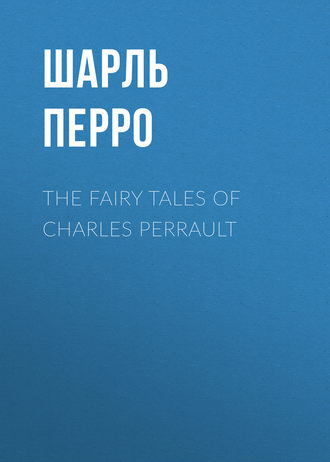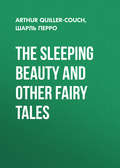
Шарль Перро
The Fairy Tales of Charles Perrault
In the mean while, all the palace awaked; every one thought upon their particular business; and as all of them were not in love, they were ready to die for hunger; the chief lady of honour, being as sharp set as other folks, grew very impatient, and told the Princess aloud, That supper was served up. The Prince helped the Princess to rise, she was entirely dressed, and very magnificently, but his Royal Highness took care not to tell her that she was dressed like his great grand-mother, and had a point-band peeping over a high collar; she looked not a bit the less beautiful and charming for all that.
They went into the great hall of looking-glasses, where they supped, and were served by the Princess's officers; the violins and hautboys played old tunes, but very excellent, tho' it was now above a hundred years since they had been played; and after supper, without losing any time, the lord almoner married them in the chapel of the castle, and the chief lady of honour drew the curtains. They had but very little sleep; the Princess had no occasion, and the Prince left her next morning to return into the city, where his father must needs have been anxious on his account. The Prince told him that he lost his way in the forest, as he was hunting, and that he had lain at the cottage of a collier, who gave him cheese and brown bread.
The King his father, who was of an easy disposition, believed him; but his mother could not be persuaded this was true; and seeing that he went almost every day a-hunting, and that he always had some excuse ready when he had laid out three or four nights together, she no longer doubted he had some little amour, for he lived with the Princess above two whole years, and had by her two children, the eldest of which, who was a daughter, was named Aurora, and the youngest, who was a son, they called Day, because he was even handsomer and more beautiful than his sister.
The Queen said more than once to her son, in order to bring him to speak freely to her, that a young man must e'en take his pleasure; but he never dared to trust her with his secret; he feared her, tho' he loved her; for she was of the race of the Ogres, and the King would never have married her, had it not been for her vast riches; it was even whispered about the court, that she had Ogreish inclinations, and that, whenever she saw little children passing by, she had all the difficulty in the world to refrain from falling upon them. And so the Prince would never tell her one word.
But when the King was dead, which happened about two years afterwards; and he saw himself lord and master, he openly declared his marriage; and he went in great ceremony to fetch his Queen from the castle. They made a magnificent entry into the capital city, she riding between her two children.
Some time after, the King went to make war with the Emperor Cantalabutte, his neighbour. He left the government of the kingdom to the Queen his mother, and earnestly recommended to her care his wife and children. He was like to be at war all the summer, and as soon as he departed, the Queen-mother sent her daughter-in-law and her children to a country-house among the woods, that she might with the more ease gratify her horrible longing.
Some few days afterwards she went thither herself, and said to her clerk of the kitchen:
"I have a mind to eat little Aurora for my dinner to morrow."
"Ah! Madam," cried the clerk of the kitchen.
"I will have it so," replied the Queen (and this she spake in the tone of an Ogress, who had a strong desire to eat fresh meat), "and will eat her with a Sauce Robert."2
The poor man knowing very well that he must not play tricks with Ogresses, took his great knife and went up into little Aurora's chamber. She was then four years old, and came up to him jumping and laughing, to take him about the neck, and ask him for some sugar-candy. Upon which he began to weep, the great knife fell out of his hand, and he went into the back-yard, and killed a little lamb, and dressed it with such good sauce, that his mistress assured him she had never eaten anything so good in her life. He had at the same time taken up little Aurora, and carried her to his wife, to conceal her in the lodging he had at the end of the court yard.
About eight days afterwards, the wicked Queen said to the clerk of the kitchen:
"I will sup upon little Day."
He answered not a word, being resolved to cheat her, as he had done before. He went to find out little Day, and saw him with a little foil in his hand, with which he was fencing with a great monkey; the child being then only three years of age. He took him up in his arms, and carried him to his wife, that she might conceal him in her chamber along with his sister, and in the room of little Day cooked up a young kid very tender, which the Ogress found to be wonderfully good.
This was hitherto all mighty well: but one evening this wicked Queen said to her clerk of the kitchen:
"I will eat the Queen with the same sauce I had with her children."
It was now that the poor clerk of the kitchen despaired of being able to deceive her. The young Queen was turned of twenty, not reckoning the hundred years she had been asleep: her skin was somewhat tough, tho' very fair and white; and how to find in the yard a beast so firm, was what puzzled him. He took then a resolution, that he might save his own life, to cut the Queen's throat; and going up into her chamber, with intent to do it at once, he put himself into as great a fury as he could possibly, and came into the young Queen's room with his dagger in his hand. He would not, however, surprise her, but told her, with a great deal of respect, the orders he had received from the Queen-mother.
"Do it, do it," said she stretching out her neck, "execute your orders, and then I shall go and see my children, my poor children, whom I so much and so tenderly loved," for she thought them dead ever since they had been taken away without her knowledge.
"No, no, Madam," cried the poor clerk of the kitchen, all in tears, "you shall not die, and yet you shall see your children again; but it must be in my lodgings, where I have concealed them, and I shall deceive the Queen once more, by giving her in your stead a young hind."
Upon this he forthwith conducted her to his chamber; where leaving her to embrace her children, and cry along with them, he went and dressed a hind, which the Queen had for her supper, and devoured it with the same appetite, as if it had been the young Queen. Exceedingly was she delighted with her cruelty, and she had invented a story to tell the King, at his return, how ravenous wolves had eaten up the Queen his wife, and her two children.
One evening, as she was, according to her custom, rambling round about the courts and yards of the palace, to see if she could smell any fresh meat, she heard, in a ground-room little Day crying, for his mamma was going to whip him, because he had been naughty; and she heard, at the same time, little Aurora begging pardon for her brother.
The Ogress presently knew the voice of the Queen and her children, and being quite mad that she had been thus deceived, she commanded next morning, by break of day (with a most horrible voice, which made every body tremble) that they should bring into the middle of the great court a large tub, which she caused to be filled with toads, vipers, snakes, and all sorts of serpents, in order to have thrown into it the Queen and her children, the clerk of the kitchen, his wife and maid; all whom she had given orders should be brought thither with their hands tied behind them.
They were brought out accordingly, and the executioners were just going to throw them into the tub, when the King (who was not so soon expected) entered the court on horse-back (for he came post) and asked, with the utmost astonishment, what was the meaning of that horrible spectacle? No one dared to tell him; when the Ogress, all inraged to see what had happened, threw herself head-foremost into the tub, and was instantly devoured by the ugly creatures she had ordered to be thrown into it for others. The King could not but be very sorry, for she was his mother; but he soon comforted himself with his beautiful wife, and his pretty children.
The Moral
To get as prize a husband rich and gay.
Of humour sweet, with many years to stay,
Is natural enough, 'tis true;
To wait for him a hundred years,
And all that while asleep, appears
A thing entirely new.
Now at this time of day,
Not one of all the sex we see
Doth sleep with such profound tranquillity:
But yet this Fable seems to let us know
That very often Hymen's blisses sweet,
Altho' some tedious obstacles they meet,
Are not less happy for approaching slow.
'Tis nature's way that ladies fair
Should yearn conjugal joys to share;
And so I've not the heart to preach
A moral that's beyond their reach.
The Master Cat or Puss in Boots
There was a miller, who left no more estate to the three sons he had, than his Mill, his Ass, and his Cat. The partition was soon made. Neither the scrivener nor attorney were sent for. They would soon have eaten up all the poor patrimony. The eldest had the Mill, the second the Ass, and the youngest nothing but the Cat.
The poor young fellow was quite comfortless at having so poor a lot.
"My brothers," said he, "may get their living handsomely enough, by joining their stocks together; but for my part, when I have eaten up my Cat, and made me a muff of his skin, I must die with hunger."
The Cat, who heard all this, but made as if he did not, said to him with a grave and serious air:
"Do not thus afflict yourself, my good master; you have only to give me a bag, and get a pair of boots made for me, that I may scamper thro' the dirt and the brambles, and you shall see that you have not so bad a portion of me as you imagine."
Tho' the Cat's master did not build very much upon what he said, he had however often seen him play a great many cunning tricks to catch rats and mice; as when he used to hang by the heels, or hide himself in the meal, and make as if he were dead; so that he did not altogether despair of his affording him some help in his miserable condition.
When the Cat had what he asked for, he booted himself very gallantly; and putting his bag about his neck, he held the strings of it in his two fore paws, and went into a warren where was great abundance of rabbits. He put bran and sow-thistle into his bag, and stretching himself out at length, as if he had been dead, he waited for some young rabbit, not yet acquainted with the deceits of the world, to come and rummage his bag for what he had put into it.
Scarce was he lain down, but he had what he wanted; a rash and foolish young rabbit jumped into his bag, and Monsieur Puss, immediately drawing close the strings, took and killed him without pity. Proud of his prey, he went with it to the palace, and asked to speak with his Majesty. He was shewed up stairs into the King's apartment, and, making a low reverence, said to him:
"I have brought you, sir, a rabbit of the warren which my noble lord the Marquis of Carabas" (for that was the title which Puss was pleased to give his master) "has commanded me to present to your Majesty from him."
"Tell thy master," said the King, "that I thank him, and that he does me a great deal of pleasure."
Another time he went and hid himself among some standing corn, holding still his bag open; and when a brace of partridges ran into it, he drew the strings, and so caught them both. He went and made a present of these to the King, as he had done before of the rabbit which he took in the warren. The King in like manner received the partridges with great pleasure, and ordered him some money to drink.
The Cat continued for two or three months, thus to carry his Majesty, from time to time, game of his master's taking. One day in particular, when he knew for certain that the King was to take the air, along the river side, with his daughter, the most beautiful Princess in the world, he said to his master:
"If you will follow my advice, your fortune is made; you have nothing else to do, but go and wash yourself in the river, in that part I shall shew you, and leave the rest to me."
The Marquis of Carabas did what the Cat advised him to, without knowing why or wherefore.
While he was washing, the King passed by, and the Cat began to cry out, as loud as he could:
"Help, help, my lord Marquis of Carabas is drowning."
At this noise the King put his head out of his coach-window, and finding it was the Cat who had so often brought him such good game, he commanded his guards to run immediately to the assistance of his lordship the Marquis of Carabas.
While they were drawing the poor Marquis out of the river, the Cat came up to the coach, and told the King that while his master was washing, there came by some rogues, who went off with his clothes, tho' he had cried out "Thieves, thieves," several times, as loud as he could. This cunning Cat had hidden them under a great stone. The King immediately commanded the officers of his wardrobe to run and fetch one of his best suits for the lord Marquis of Carabas.
The King received him with great kindness, and as the fine clothes he had given him extremely set off his good mien (for he was well made, and very handsome in his person), the King's daughter took a secret inclination to him, and the Marquis of Carabas had no sooner cast two or three respectful and somewhat tender glances, but she fell in love with him to distraction. The King would needs have him come into his coach, and take part of the airing. The Cat, quite overjoyed to see his project begin to succeed, marched on before, and meeting with some countrymen, who were mowing a meadow, he said to them:
"Good people, you who are mowing, if you do not tell the King, that the meadow you mow belongs to my lord Marquis of Carabas, you shall be chopped as small as mince-meat."
The King did not fail asking of the mowers, to whom the meadow they were mowing belonged.
"To my lord Marquis of Carabas," answered they all together; for the Cat's threats had made them terribly afraid.
"Truly a fine estate," said the King to the Marquis of Carabas.
"You see, sir," said the Marquis, "this is a meadow which never fails to yield a plentiful harvest every year."
The Master Cat, who still went on before, met with some reapers, and said to them:
"Good people, you who are reaping, if you do not tell the King that all this corn belongs to the Marquis of Carabas, you shall be chopped as small as mince-meat."
The King, who passed by a moment after, would needs know to whom all that corn, which he then saw, did belong. "To my lord Marquis of Carabas," replied the reapers; and the King again congratulated the Marquis.
The Master Cat, who went always before, said the same words to all he met; and the King was astonished at the vast estates of my lord Marquis of Carabas.
Monsieur Puss came at last to a stately castle, the master of which was an Ogre, the richest had ever been known; for all the lands which the King had then gone over belonged to this castle. The Cat, who had taken care to inform himself who this Ogre was, and what he could do, asked to speak with him, saying, he could not pass so near his castle, without having the honour of paying his respects to him.
The Ogre received him as civilly as an Ogre could do, and made him sit down.
"I have been assured," said the Cat, "that you have the gift of being able to change yourself into all sorts of creatures you have a mind to; you can, for example, transform yourself into a lion, or elephant, and the like."
"This is true," answered the Ogre very briskly, "and to convince you, you shall see me now become a lion."
Puss was so sadly terrified at the sight of a lion so near him, that he immediately got into the gutter, not without abundance of trouble and danger, because of his boots, which were ill-suited for walking upon the tiles. A little while after, when Puss saw that the Ogre had resumed his natural form, he came down, and owned he had been very much frightened.
"I have been moreover informed," said the Cat, "but I know not how to believe it, that you have also the power to take on you the shape of the smallest animals; for example, to change yourself into a rat or a mouse; but I must own to you, I take this to be impossible."
"Impossible?" cried the Ogre, "you shall see that presently," and at the same time changed into a mouse, and began to run about the floor.
Puss no sooner perceived this, but he fell upon him, and ate him up.
Meanwhile the King, who saw, as he passed, this fine castle of the Ogre's, had a mind to go into it. Puss, who heard the noise of his Majesty's coach running over the drawbridge, ran out and said to the King:
"Your Majesty is welcome to this castle of my lord Marquis of Carabas."
"What! my lord Marquis?" cried the King, "and does this castle also belong to you? There can be nothing finer than this court, and all the stately buildings which surround it; let us go into it, if you please."
The Marquis gave his hand to the Princess, and followed the King, who went up first. They passed into a spacious hall, where they found a magnificent collation which the Ogre had prepared for his friends, who were that very day to visit him, but dared not to enter knowing the King was there. His Majesty was perfectly charmed with the good qualities of my lord Marquis of Carabas, as was his daughter who was fallen violently in love with him; and seeing the vast estate he possessed, said to him, after having drank five or six glasses:
"It will be owing to yourself only, my lord Marquis, if you are not my son-in-law."
The Marquis making several low bows, accepted the honour which his Majesty conferred upon him, and forthwith, that very same day, married the Princess.
Puss became a great lord, and never ran after mice any more, but only for his diversion.
The Moral
How advantageous it may be,
By long descent of pedigree,
T'enjoy a great estate,
Yet knowledge how to act, we see,
Join'd with consummate industry,
(Nor wonder ye thereat)
Doth often prove a greater boon,
As should be to young people known.
Another
If the son of a miller so soon gains the heart
Of a beautiful princess, and makes her impart
Sweet languishing glances, eyes melting for love,
It must be remark'd of fine clothes how they move,
And that youth, a good face, a good air, with good mien,
Are not always indifferent mediums to win
The love of the fair, and gently inspire
The flames of sweet passion, and tender desire.







